 | |
Bosnia and Herzegovina | Canada |
|---|---|
| Envoy | |
Bosnia and Herzegovina and Canada established bilateral relations in 1992. Bosnia and Herzegovina has an embassy in Ottawa. Canada has a non resident ambassador in Budapest.
 | |
Bosnia and Herzegovina | Canada |
|---|---|
| Envoy | |
Bosnia and Herzegovina and Canada established bilateral relations in 1992. Bosnia and Herzegovina has an embassy in Ottawa. Canada has a non resident ambassador in Budapest.
Since 1992, more than 40,000 Canadians have served in Bosnia-Herzegovina in Operation Harmony for the United Nations and in Operation Palladium for NATO. 25 Canadians have lost their lives while serving in Bosnia-Herzegovina [1]
In 1992, more than 1,500 Canadian troops were sent to act as peacekeepers in the Bosnian War. [2] As of the fall of 1999, about 1,300 Canadian troops remained in Bosnia-Herzegovina as part of the NATO-led Operation Joint Endeavour , designed to enforce the Dayton Peace Accord of 1995. [3]
According to the 2016 Canadian Census, there were over 38,000 people in Canada who identified as having Bosnian ancestry. [4]

Bosnia and Herzegovina, sometimes known as Bosnia-Herzegovina and informally as Bosnia, is a country in Southeast Europe, situated on the Balkan Peninsula. It borders Serbia to the east, Montenegro to the southeast, and Croatia to the north and southwest. In the south it has a 20 kilometres long coast on the Adriatic Sea, with the town of Neum being its only access to the sea. Bosnia has a moderate continental climate with hot summers and cold, snowy winters. In the central and eastern regions, the geography is mountainous, in the northwest it is moderately hilly, and in the northeast it is predominantly flat. Herzegovina, the smaller, southern region, has a Mediterranean climate and is mostly mountainous. Sarajevo is the capital and the largest city.

The Siege of Sarajevo was a prolonged blockade of Sarajevo, the capital of Bosnia and Herzegovina, during the Bosnian War. After it was initially besieged by the forces of the Yugoslav People's Army, the city was then besieged by the Army of Republika Srpska. Lasting from 5 April 1992 to 29 February 1996, it was three times longer than the Battle of Stalingrad, more than a year longer than the siege of Leningrad, and was the longest siege of a capital city in the history of modern warfare.

The Yugoslav Wars were a series of separate but related ethnic conflicts, wars of independence, and insurgencies that took place from 1991 to 2001 in what had been the Socialist Federal Republic of Yugoslavia. The conflicts both led up to and resulted from the breakup of Yugoslavia, which began in mid-1991, into six independent countries matching the six entities known as republics that had previously constituted Yugoslavia: Slovenia, Croatia, Bosnia and Herzegovina, Montenegro, Serbia, and Macedonia. SFR Yugoslavia's constituent republics declared independence due to unresolved tensions between ethnic minorities in the new countries, which fueled the wars. While most of the conflicts ended through peace accords that involved full international recognition of new states, they resulted in a massive number of deaths as well as severe economic damage to the region.

The Bosnian War was an international armed conflict that took place in Bosnia and Herzegovina between 1992 and 1995. The war is commonly seen as having started on 6 April 1992, following several earlier violent incidents. It ended on 14 December 1995 when the Dayton Accords were signed. The main belligerents were the forces of the Republic of Bosnia and Herzegovina, the Republic of Herzeg-Bosnia, and the Republika Srpska, the latter two entities being proto-states led and supplied by Croatia and Serbia, respectively.
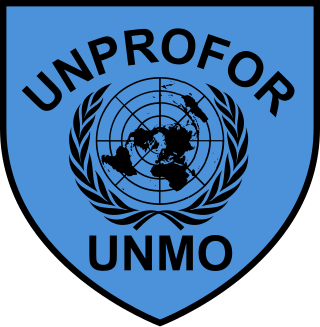
The United Nations Protection Force was the first United Nations peacekeeping force in Croatia and in Bosnia and Herzegovina during the Yugoslav Wars. The force was formed in February 1992 and its mandate ended in March 1995, with the peacekeeping mission restructuring into three other forces.

Operation Althea, formally the European Union Force Bosnia and Herzegovina (EUFOR), is a military deployment in Bosnia and Herzegovina to oversee the military implementation of the Dayton Agreement. It is the successor to NATO's SFOR and IFOR. The transition from SFOR to EUFOR was largely a change of name and commanders: 80% of the troops remained in place. It replaced SFOR on 2 December 2004.

Operation Deliberate Force was a sustained air campaign conducted by NATO, in concert with the UNPROFOR ground operations, to undermine the military capability of the Army of Republika Srpska, which had threatened and attacked UN-designated "safe areas" in Bosnia and Herzegovina during the Bosnian War with the Srebrenica genocide and Markale massacres, precipitating the intervention. The shelling of the Sarajevo marketplace on 28 August 1995 by the VRS is considered to be the immediate instigating factor behind NATO's decision to launch the operation.

The Bangladesh Armed Forces and the Bangladesh Police have been actively involved in a number of United Nations Peace Support Operations (UNPSO) since 1988. Currently Bangladesh is the largest contributor in the UN peacekeeping missions.

The foreign, diplomatic, economic, and political relations between Croatia and the United States were established on April 7, 1992 following the dissolution of Yugoslavia. After Croatia's debut as an independent state in 1996, the U.S. established the country as its most important political connection to Southeast Europe. Modern relations are considered to be warm and friendly, with stalwart bilateral collaboration. The Croatian diaspora in the U.S. is estimated to be around 500,000 which, in part, informs the foreign policy of Croatia. The two nations have strong connectivity through tourism, immigration, foreign aid, and economic mutualism.

Bosnia and Herzegovina–Russia relations are the bilateral relations between the two countries, Bosnia and Herzegovina and Russia. Bosnia is one of the countries where Russia has contributed troops for the NATO-led stabilization force. Russia recognized the independence of Bosnia and Herzegovina on 27 April 1992.
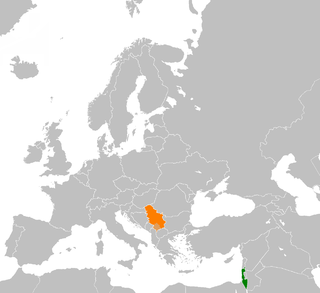
The diplomatic relations between Israel and Serbia were established on January 31, 1992, when Serbia was part of FR Yugoslavia. Israel has an embassy in Belgrade and Serbia had one in Tel Aviv. Yugoslavia was the second country in Europe to recognize Israel in 1948. The two countries have economic and cultural ties, helped by a sizable community of Jews from the former Yugoslavia in Israel. Serbia agreed to move its embassy to Jerusalem on 4 September 2020 but decided not to after Israeli recognition of Kosovo as a sovereign state, something Serbia disputes.
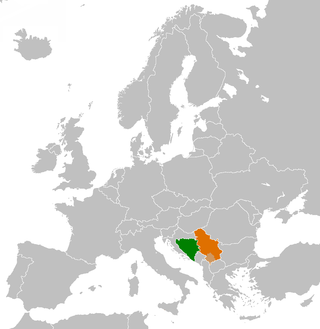
The modern-day countries of Bosnia and Herzegovina and Serbia both originated from Yugoslavia. The majority of population in both countries speak one of the standard varieties of Serbo-Croatian and Serbia is one of the largest investors in Bosnia and Herzegovina.

The siege of Srebrenica was a three-year siege of the town of Srebrenica in eastern Bosnia and Herzegovina which lasted from April 1992 to July 1995 during the Bosnian War. Initially assaulted by the Yugoslav People's Army (JNA) and the Serbian Volunteer Guard (SDG), the town was encircled by the Army of Republika Srpska (VRS) in May 1992, starting a brutal siege which was to last for the majority of the Bosnian War. In June 1995, the commander of the Army of the Republic of Bosnia and Herzegovina (ARBiH) in the enclave, Naser Orić, left Srebrenica and fled to the town of Tuzla. He was subsequently replaced by his deputy, Major Ramiz Bećirović.

Operation Sky Monitor was a NATO mission to monitor unauthorized flights in the airspace of Bosnia and Herzegovina during the Bosnian War. The operation began in response to United Nations Security Council Resolution 781, which established a ban on the use of military aircraft in Bosnian airspace, and requested the aid of member states in monitoring compliance. Beginning on October 16, 1992, NATO monitored violations of the no-fly zone using E-3 Sentry NAEW aircraft based in Germany, Italy, Greece, and the United Kingdom. The operation documented more than 500 violations of the no-fly zone by April 1993. In response to this high volume of unauthorized flights, the Security Council passed Resolution 816, which authorized NATO to enforce the no-fly zone, and engage violators. In response, NATO deactivated Sky Monitor on April 12, 1993, transferring its forces to the newly established Operation Deny Flight.

The NATO intervention in Bosnia and Herzegovina was a series of actions undertaken by NATO whose stated aim was to establish long-term peace during and after the Bosnian War. NATO's intervention began as largely political and symbolic, but gradually expanded to include large-scale air operations and the deployment of approximately 60,000 soldiers of the Implementation Force.
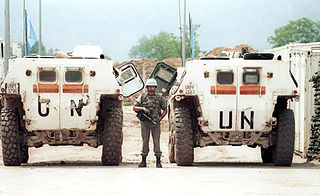
The Battle of Vrbanja Bridge was an armed confrontation which took place on 27 May 1995, between United Nations (UN) peacekeepers from the French Army and elements of the Bosnian Serb Army of Republika Srpska (VRS). The fighting occurred at the Vrbanja Bridge crossing of the Miljacka river in Sarajevo, Bosnia and Herzegovina, during the Bosnian War. The VRS seized the French-manned United Nations Protection Force (UNPROFOR) observation posts on both ends of the bridge, taking hostage 12 French peacekeepers. Ten were taken away, and two were kept at the bridge as human shields.
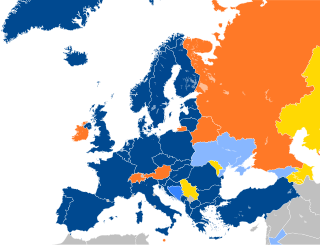
NATO maintains foreign relations with many non-member countries across the globe. NATO runs a number of programs which provide a framework for the partnerships between itself and these non-member nations, typically based on that country's location. These include the Euro-Atlantic Partnership Council and the Partnership for Peace.
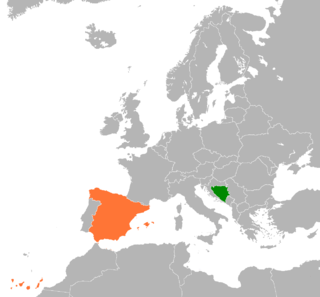
Bosnia and Herzegovina–Spain relations were formally established on 14 December 1992.

The siege of Goražde refers to engagements during the Bosnian War (1992–95) in and around the town of Goražde in eastern Bosnia.
Foreign support in the Bosnian War included the funding, training or military support by foreign states and organizations outside Yugoslavia to any of the belligerents in the Bosnian War (1992–95).